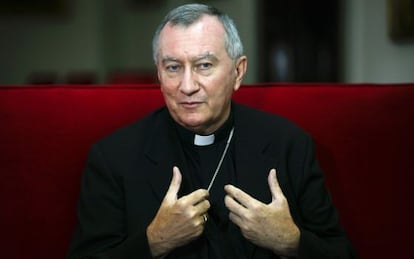“Celibacy is not a dogma,” says the Vatican’s new Secretary of State


Mandatory celibacy “is not a dogma of faith” according to Pietro Parolin and “it can be disputed because it is an ecclesiastical tradition.” The newly appointed Secretary of State of the Vatican and current papal ambassador to Venezuela thus revealed the mood in this new government. Parolin, who will be the second in command in Rome after Pope Francis, spoke to the Venezuelan newspaper El Universal.
Besides recognizing the truth about one of the Church doctrines that many conservative theologians have trouble admitting -that mandatory celibacy is not part of an immutable article of faith- Parolin got into another sensitive and controversial issue, democracy within the Church. According to the new Secretary of State, although "it has always been said that the Church is not a democracy," nowadays it must -as "an embrace of the changing times"- show a "democratic spirit." It must "listen carefully" to the faithful and to the rest of the world, he said. Parolin expects this task to be one of "the objectives of the papacy" under Pope Francis.
The reforms that the Church will undertake and in which Parolin will participate due to his position will have the stamp of that "democratic spirit," he said. In a departure from how things were done in the past, decisions will not be made within the silence of papal halls, without listening to the voice of the Church at large. Instead they will be collegial and then they will be confirmed by the pope.
With regards to celibacy, Parolin said that any decision on such a delicate issue would to be a "challenge" for the pope and that Francis would first consult the entire ministry. According to the ambassador such decisions should "bring the Church together, not divide it." Evidently Parolin would not have tackled this topic before taking office if he did not feel that the pope shares his opinion, the pope who once reminded the Argentine rabbi Abraham Skorka that the Orthodox Church, which has not separated from Rome, does "admit married priests."
Parolin's affirmation that celibacy is not a religious tenet and as such may be abolished seems obvious. Yet the mere fact of saying so and then positioning it as something Pope Francis will consider is revolutionary.
The early Church did not practice celibacy. Most of the apostles were married. According to the Gospel, Jesus "cured Peter's mother-in-law," and he, Peter, became the first pope of the Church. St. Paul explains the rules of conduct for any aspiring bishop in the First Epistle to Timothy: be "without reproach, the husband of one wife, temperate, sensible, modest, hospitable... not quarrelsome, not covetous." Paul adds that he should be "one who rules his own house well, having children in subjection with all reverence. Because if a man doesn’t know how to rule his own house, how will he take care of the assembly of God?," Timothy 3:4-5.
St. Paul is not talking about priests. From his perspective even a bishop should be married and have children. The only prohibition is that he be married to only one woman, meaning that he must abstain from adultery.
Mandatory celibacy was introduced in 390 AD and, as Parolin points out, it cannot be ignored as a long held tradition of the Church. Yet he says the Church lives in a very different world and that it must be receptive of the "signs of the times."
As Parolin's statements indicate, Francis is determined to make more than cosmetic changes in the Church. Parolin, a figure already high up in the hierarchy of the Church, and the soon-to-be Secretary of State of the Vatican, has always been an influential force in the direction of the papacy.
Translation: Dyane Jean François
Tu suscripción se está usando en otro dispositivo
¿Quieres añadir otro usuario a tu suscripción?
Si continúas leyendo en este dispositivo, no se podrá leer en el otro.
FlechaTu suscripción se está usando en otro dispositivo y solo puedes acceder a EL PAÍS desde un dispositivo a la vez.
Si quieres compartir tu cuenta, cambia tu suscripción a la modalidad Premium, así podrás añadir otro usuario. Cada uno accederá con su propia cuenta de email, lo que os permitirá personalizar vuestra experiencia en EL PAÍS.
¿Tienes una suscripción de empresa? Accede aquí para contratar más cuentas.
En el caso de no saber quién está usando tu cuenta, te recomendamos cambiar tu contraseña aquí.
Si decides continuar compartiendo tu cuenta, este mensaje se mostrará en tu dispositivo y en el de la otra persona que está usando tu cuenta de forma indefinida, afectando a tu experiencia de lectura. Puedes consultar aquí los términos y condiciones de la suscripción digital.








































